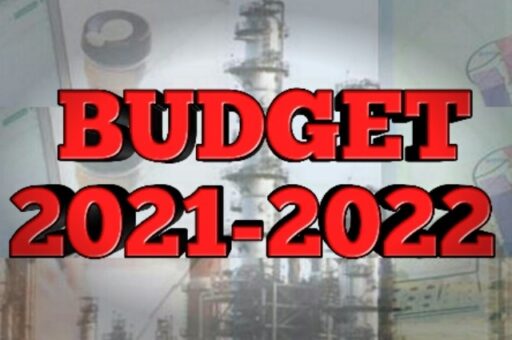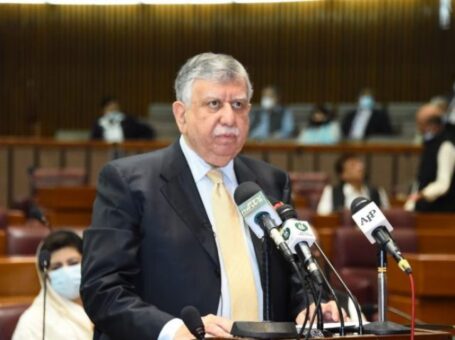ISLAMABAD: The federal government on Friday presented budget 2021/2022 and announced measures in regime of customs duty.
GUIDING PRINCIPLES
(a) Remove anomalies in cascading structure of tariff
(b) Promote and protect domestic industry by introducing targeted interventions
(c) Enhance import-substitution by rationalizing tariffs on industrial raw materials / intermediate goods
(d) Facilitate export-oriented manufacturing by reviewing the existing exemption regimes & export schemes
INDUSTRIAL RELIEF MEASURES
1. Reduction / exemption of CD, ACD & RD on import of goods falling under 589 PCT codes to incentivize the textile industry.
2. Reduction / exemption of CD, ACD & RD on import of flat rolled products of HRC and stainless steel.
3. Reduction / exemption of CD and ACD on raw materials and intermediary goods and point of sale machines falling under 328 tariff lines as a consequent of tariff rationalization.
4. To incentivize the pharmaceutical sector and to keep the prices stable in the market, –
Exemption of CD & ACD on more than 350 APIs
Plant, machinery and equipment subject to concessionary rate of 5%
Exemption of CD & ACD on raw material of auto-disable syringes and Reduction in tariff on finished auto-disable syringes
5. Reduction / exemption on inputs / raw materials of food processing industry.
6. Reduction of CD & ACD on uncoated paper and paperboard for printing and graphic arts industry.
7. Reduction / exemption of CD & ACD on Vaccines for veterinary medicines and feed additives to incentivize the dairy sector.
8. Reduction / exemption of CD & ACD on goods falling under more than 100 PCT codes relating to Tourism industry.
9. Reduction of duties on raw material/inputs of footwear industry.
10. Reduction / exemption of CD & ACD on inputs for poultry industry.
11. Reduction / exemption of CD & ACD on raw material for manufacturer of aseptic plastic packaging.
12. Exemption of ACD on import of raw materials for cables / optical fiber manufacturers.
13. Reduction / Exemption of CD & ACD on raw materials for Paint Industry.
14. Reduction / Exemption of CD & ACD on raw materials for Chemical and Artificial Leather Industry.
15. Reduction / Exemption of CD & ACD on inputs for Electronics Manufacturing Industry.
16. Reduction / exemption of CD & ACD on raw materials / inputs of furniture, coating, boiler manufacturing industry, bobbins and cops manufacturing industry etc.
RELIEF TO COMMON MAN
17. Reduction of ACD on goods falling under 2436 tariff lines pertaining to 20% customs duty slab from 7% to 6%.
18. Extension in exemption from customs duties on import of COVID-19 related items for further six month.
19. Exemption of CD &ACD on Inputs of Ready-To-Use Supplementary Foods (RUSF) and Ready-To-Use Therapeutic Food (RUTF).
20. Exemption of CD & ACD on 06 life-saving drugs.
21. Enhance the value of unsolicited gifts through post or courier from Rs.20,000 to 30,000.
22. Exemption of CD & ACD on import of grain storage hermetic bags and cocoons.
23. Rationalization of tariff structure on auto sector.
REVIEW OF REGULATORY DUTY (RD) REGIME:
24. Rationalization of RD on import of Mobile Phones to encourage import substitution
25. Increase in rates of RD on import of non-essential / luxury items to support local industry.
26. Reduction of RD on import of cocoa paste, butter and powder being industrial input goods.
EXPORT FACILITATION MEASURES:
27. To ease of doing business, a new Uniform Export Facilitation Scheme is being proposed. The existing schemes shall be phased out in next two years.
28. Bond to Bond Transfer of goods through WeBOC without prior approval of the Collector is being proposed to be allowed.
29. Reduction of RD on export of molasses, skin and hides to boost positive image of the country with our important trading partners across the world.
MISCELLANEOUS
1. Establishment of Border Sustenance Markets to mitigate the problems faced by the people residing in border areas due to fencing and counter-smuggling measures.
LEGISLATIVE CHANGES:
1) Introduction of a concept of Common bonded warehousing to encourage Small and Medium Enterprises.
2) Empowering Collector of customs to determine customs value there by facilitating trade.
3) Enabling the Director General Valuation to take appropriate decision on appeal and capping the time limit for such proceedings. Facilitation of trade by avoiding time consumed in unnecessary litigations.
4) Allowing the importers to amend manifest till berthing event without seeking approval from custom authorities and hence ease of doing business.
5) Enable customs authorities to allow bonafide amendment in into-bonds goods declaration and thus facilitate trade.
6) Allowing the Collector to extend warehousing period for six months. Reducing the processing time of the requests and promoting ease of doing business.
7) Reducing the time limit allowed for decision of the cases wherein the impugned goods are lying at sea ports, airports or dry-ports and thus decreasing the cost of doing business.
8) Enable customs authorities to issue correction / corrigendum certificate in case of genuine / obvious error and facilitate trade.
9) Inclusion of other law enforcement agencies for the purpose of reward and increasing their motivation.
10) Affording opportunity of being heard to the registered users of WeBOC in accordance with the canons of natural justice.
11) Increasing the period of validity of advance ruling from the current one year to three years in accordance with international benchmarks and facilitating trade thereof.
12) Provision for the classification committee to avoid unnecessary litigation on account of classification disputes and consequently decreasing the cost of doing business.
13) Removal of fine in case of delay in filing of goods declaration and thereby providing ease of doing business.
ENFORCEMENT FEATURES:
1) Inclusion of master bill of lading and certificate of origin in the existing definition of document to discourage origin fraud.
2) Inclusion of the retailing in definition of smuggling to discourage retailers from selling smuggled goods.
3) Making shipping lines responsible for re-export of banned items imported in commercial quantities.
4) Increasing the pitch of fine in case of non-placement of invoice and packing list in container to inculcate compliance.
5) Discouraging smuggling by denying release of vehicles used repeatedly for smuggling against redemption fine.

